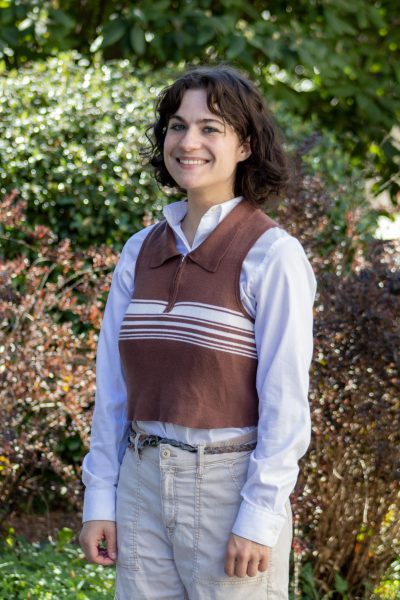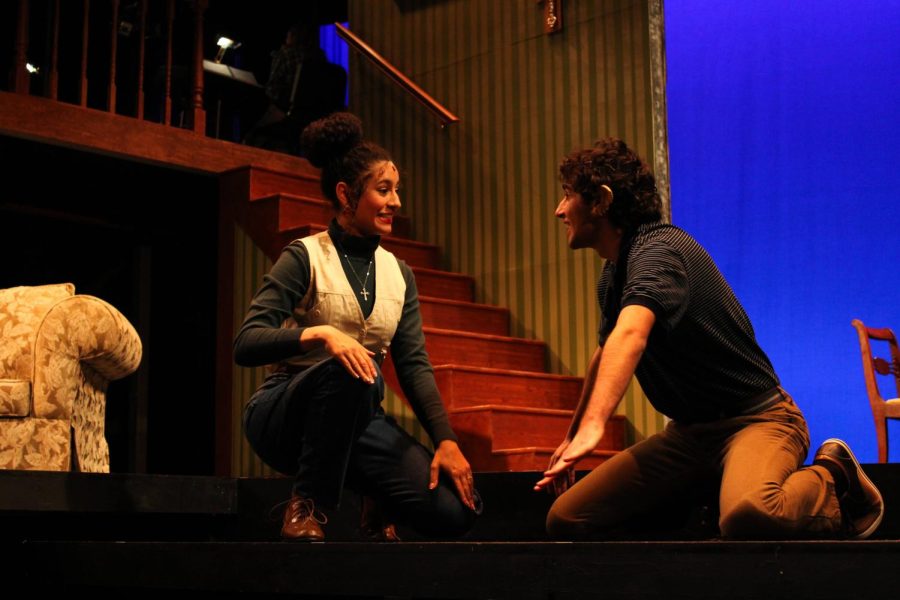“Bat Boy” production adapts scenes due to its content
A new American University Theatre Program musical debuted on Feb. 16. However, “Bat Boy” comes with a content warning.
“Bat Boy” is about a half-bat/half-boy named Edgar who tries to integrate with normal society in the fictional town of Hope Falls, West Virginia, according to Broadway Licensing.
Jason Zuckerman, who plays the lead role, Edgar, said that the program and actors who worked on the play adapted some of the scenes due to their explicit content. Zuckerman said he admires how the town accepts his character despite his differences at the beginning of the second act.
“It’s gotten easier the more I’ve done it,” Zuckerman said in an in-person interview. “Especially as we’ve gotten into full runs of the show, but it was an adjustment.”
“Bat Boy” contains reworked content for AU’s production, Zuckerman said. According to the AU arts website, the show includes “guns and violence, sexual assault and rape, suicide, incest, simulated animal harm, blood, flashing lights and atmospheric haze.”
According to the program’s Instagram page, AU has performed musicals and plays such as “Fefu and Her Friends” and “The Pliant Girls.” Both of these contain sensitive content, according to LitCharts for “Fefu and Her Friends” and the website of the author of “Pliant Girls.” “Bat Boy” is the only current theater production listed on the AU arts website that is accompanied by a content warning. Elizabeth Deal, the assistant vice president for community and university internal communications, said providing content warnings is common.
“The Department of Performing Arts has many plays or musicals where we provide audience trigger or sensitivity warning on various platforms,” Deal said. “These include online ticket listings, at the entrance/box office to help inform patrons and in the production’s program booklet. This is a standard practice across the professional arts community.”
In the musical, the local veterinarian, Dr. Thomas Parker, and his family adopt Edgar. Meredith, Dr. Parker’s wife, and Shelley, his daughter, accept Edgar, but the rest of the town is not as receptive to him, according to Broadway Licensing.
According to Broadway Licensing, Dr. Parker grows jealous of the love that Meredith gives Edgar and plots to sabotage Edgar. After facing hate from the townsfolk, Edgar and Shelley fall in love and run away together. However, their romantic endeavors end when Meredith reveals Edgar’s shocking origin story.
Edgar’s backstory, revealed in the second act, depicts a rape scene, and the ending contains multiple major character deaths and incest. Aisley Wallace Harper, who plays Meredith, said this was one of the most challenging parts for her.
“There is a pretty explicit sequence that gets into how my character was sexually assaulted and raped not only by her husband but also, spoiler alert, by bats, and that’s how Bat Boy was created,” Wallace Harper said in an in-person interview. “Our wonderful director decided to have most of this really long, eight-page sequence on a voice-over so we don’t have to act it out, which helped tremendously in this process and made it comfortable.”
The backstory scene uses a voice-over and shadow puppets of bats, houses and test tubes. Zuckerman said he liked the light atmosphere it created.
“I know some other productions have used big visual screens and stuff, and we just chose not to do that,” Zuckerman said. “Shadow puppetry, I think, is seen as fun and light, so I think we just wanted to lighten it up as much as possible.”
First-year Leah Bordatto, who saw the show on Feb. 17, said in a text interview she appreciated that the program adapted the scene but questioned the effectiveness of shadow puppets.
“Even though that scene was the scene that ultimately made me most uncomfortable, I think they did what they could with the material,” Bordatto said. “I don’t know if I necessarily think it was the best portrayal considering the tone, but it did feel like it made the story clearer as it contained a lot of details.”
Second-year student Emma Altrichter, who also saw the show on Feb. 17, said in a text interview she liked the shadow puppets because they were creative.
“I think puppetry is a really cool part of theater that we don’t get to see much,” Altrichter said. “I think the shadows also sort of represent a darker side of life. With Edgar living in the shadows most of his life, it felt like a fitting choice.”
Wallace Harper said that only necessary actors and crew members were included in the voice-over recording.
Actors also had an alternative to kissing if they weren’t feeling up to it that day, and a safe word if anyone needed to stop the rehearsal, Wallace Harper said. She also said actors checked in with boundaries every rehearsal or performance and noted what each actor was comfortable doing.
“[The intimacy coordinator]…gave us boundary exercises and desexualized our entire body so that when we’re referring to what can be touched, we use ‘the pelvic area’ and not ‘the bikini line’ or ‘my private parts,’” Wallace Harper said. “There’s definitely people who had more intimate moments than me, but for me, it was really nice.”
Zuckerman said the strangest part for him was when his character discovers that he’s fallen in love with his biological half-sister.
“I just kind of needed to look at it from the perspective of my character and the fact that he didn’t know that it was his sister and he was very upset,” Zuckerman said. “I kind of just tried to take myself out of it a little bit more to make it easier to do.”
The director suggested to the actors that they choose a piece of clothing or jewelry to attach to their character, Wallace Harper said. When they put on that item, they can take in all of the trauma their character faces throughout the show, and when they remove it, they can return to their normal lives without the weight of everything they rehearsed that day.
Wallace Harper said that she appreciates the resources the director, Clancey Yovanovich, put into making the cast’s experience more comfortable.
“It could have been a completely different experience if the DPA and our director, Clancey, did not put as much time and resources into hiring an intimacy and fight choreographer,” Wallace Harper said. “They just have listened to all of our needs and worries. And I think everyone is so incredibly appreciative of being able to have an experience that feels so safe, that we can walk away from and feel proud of our work even though it’s really hard to get through sometimes.”
Zuckerman said he admired Edgar’s acceptance into society and how the story satirized fear-mongering. Zuckerman also said that as he worked more with these themes, he grew to appreciate the story itself more.
“It’s easy to just focus on the funny parts of the show and how ridiculous the story is, but I just love how it takes the audience actually paying attention and listening to the words and lyrics that are being spoken to get the message,” Zuckerman said. “My appreciation for the show has grown the more I’ve worked with it because when I first watched it before auditions, I was like, ‘This is kind of ridiculous,’ and the more I’ve done it, the more I’ve grown to realize the great message that it actually has.”
The university theater department will perform the musical until Feb. 25. General admission tickets are $10 to $15 but are free for students.

Kate Kessler (she/her) has been a member of AWOL since the fall of 2022 and is excited to be acting as a staff editor for her final year at AU. She...












